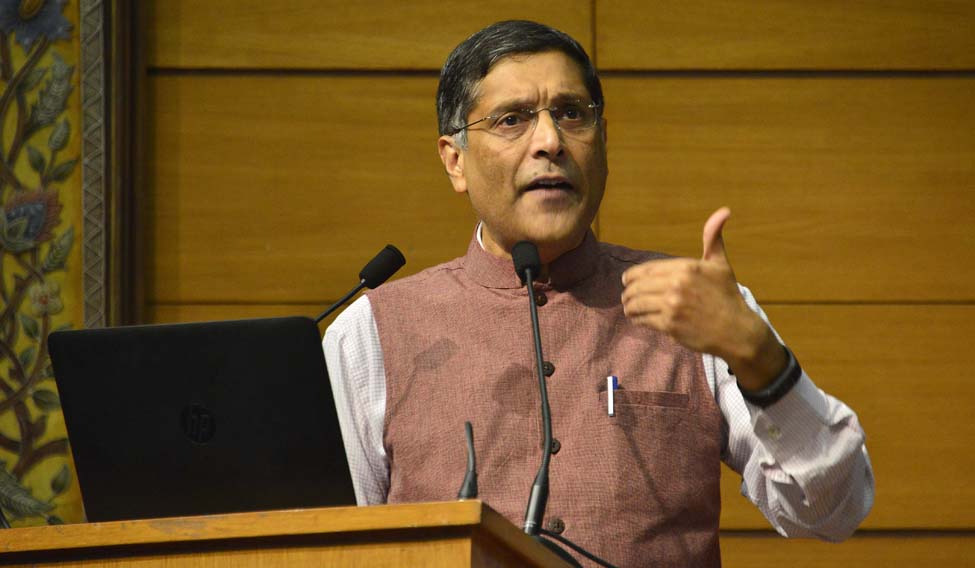The Indian economy will grow at the lower end of a 6.75 pc to 7.5 pc growth rate band, predicted Chief Economic Adviser Arvind Subramanian, in the second part of his Economic Survey for 2017-18, presented before the Parliament on Friday.
Subsequent to the Parliament presentation, Subramanian briefed the media but refrained from pronouncing any number for economic growth this year.
"Balance of risks to growth has shifted to the downside. The balance of probabilities have also shifted from the upper end of the growth forecast made in February (Economic Survey 2017-18, part 1) to the lower range," said Subramanian.
"Accordingly, we are not changing the growth outlook," he said.
While recounting the many benefits of demonetisation move, Subramanian said that the move to take out of circulation 86 per cent cash from the economy in November last year had helped increase the tax base.
"There is a growth of 5.4 lakh new taxpayers, which is 20 per cent higher than the corresponding period before demonetisation," Subramanian said.
Whether this rise in tax base results in more tax collection remains to be seen, he said, adding that most new registered taxpayers were declaring their incomes lower than the threshold for tax.
The chief economic adviser cautioned that valuations of market assets, like debentures and stocks, were near the all-time high of 2007-08, which was followed by the financial crash of 2009.
"As to when this valuations could come down we do not know. But we all know that it does fall after such rise," he said.
Stressing on impact of farm loan waivers announced by states, the CEA said that the total cost of these waivers would range between Rs 1.25 lakh crore to 2.5 lakh crores. This, he believes, would drag down the GDP growth by 0.3-0.7 per cent and have a deflationary impact on the economy.
"The Uttar Pradesh budget slashed its capital expenditure budget by 13 per cent to accomodate farm loan waivers. This will mean lesser spending power in the economy."
Subramanian also warned that the rise in profitability and the rise in debt levels are alarmingly high for the power and telecom sector. "In telecom, we are seeing this stress for a new entrant; in power sector, it is due to rise of renewables," he said.
As for agricultural stress, Subramanian says that this remains a mystery. "There is a reduction in farm revenue despite better output and better monsoon."
He said that better MSP and better procurement of non-cereal crops should be explored. Subramanian also said that this could be the right time to explore the option of providing "direct support to farmers, instead of indirect support doled out to farm input companies, could be more effective".
Citing the problem of lower capital utilisation and quoting Taylor's rule of real interest rates, the Economic Survey has argued for interest rates to be lowered by at least 75 basis points from where they are now, considering that there is a slack in the economy presently.
However, the Economic Survey remained silent or at best brief on a number of subjects related to employment and utilisation of labour capital. "I almost feel that you are offended, but there is no good and reliable employment data to focus on for the Economic Survey," Subramanian told THE WEEK.
Among other things, the Economic Survey also talks about bringing in a Transparency of Rules Act, to form a Wikipedia-like repository of government rules that a citizen is expected to follow.
This, if adopted, principal economic adviser in finance ministry Sanjiv Sanyal says, willl result in the end of prevailing confusion caused by a rule and subsequently many circulars.






